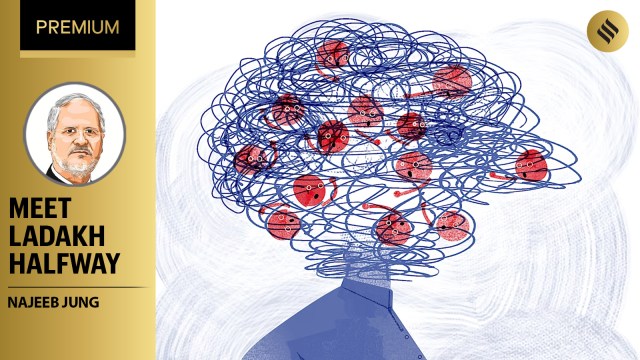
Nations do not fall because of foreign conquest alone — they crumble from within when the bonds of unity snap under the weight of discontent and mistrust. It’s tragic how often national governments, motivated by political interests and the magnetic attraction to votes, neglect vital threads that tie a nation together. India is currently facing many of the above challenges. An overtly majoritarian agenda has begun to affect the confidence of minorities. In Manipur, tribal communities who have lived together for centuries have turned against one another because of partisanship and inept governance. The tragedy of Kashmir will long be remembered. Many parts of south India look askance with distrust at what they think is the dominance of the north.
Ladakh is now adding to this growing tale. Bordering Tibet to the east and Pakistan to the west, it is a vital crossroads between Central Asia, Tibet and the Indian Subcontinent. It was once an important hub for trade, particularly along the ancient Silk Road. Through centuries, the region’s people survived through careful negotiation with the harsh environment, combining monastic discipline with ecological wisdom. They have lived in harmony practising agriculture, animal husbandry, and traditional crafts like weaving and thangka paintings. Today, their predicament is more than a constitutional anomaly — it’s a cautionary tale of governing without representation. Decisions about land, hydropower, and mining in Ladakh are largely taken in Delhi or by corporates, often without consulting local people. The corporates in any case have an unenviable record of ruthlessness towards nature and local residents across India — in Jharkhand, Bihar, Chhattisgarh or any state where they get a foothold.
The unrest in Ladakh did not erupt overnight. Its roots go back to August 2019 when Article 370 was revoked, dividing the state of Jammu and Kashmir into two Union Territories — Jammu and Kashmir, and Ladakh. For many Ladakhis who had long demanded separation from Srinagar’s administrative control, the initial reaction was cautious optimism. They believed UT status would mean direct access to the Centre and a greater say in governance. Among those who applauded this move was the now discredited and incarcerated Sonam Wangchuk.
Six years later, Ladakh is disillusioned. The restoration of statehood, or at the very least inclusion under the Sixth Schedule of the Constitution — that grants autonomous powers to tribal areas — which lies at the core of the demands of the protesters, seems far. This vacuum creates anger.
The violence of late September, which left four people dead and dozens injured, followed by Wangchuk’s arrest, has created multiple problems. By all accounts, he has been taken in under the dreaded National Security Act on grounds that are allegedly vague. The FCRA account of his NGO stands cancelled, and he has been labelled an “anti-national” who visited Pakistan. While it is for the courts to decide the credibility of these charges, no one in the country has illusions about them. His NGO has done good work over the years that has won him international recognition, including the Magsaysay award. His visit to Pakistan was for an environmental conference and is well documented.
The local government’s response to the agitation — curfews, internet bans, preventive arrests — is exactly the recipe that civil administrations follow when the situation is devoid of political dialogue. The confusion and poor handling by the Lieutenant Governor are clear from off-the-cuff remarks he has made about the disturbance.
The unrest in Ladakh has an additional, dangerous dimension: China. Since the Galwan clashes in 2020, the Line of Actual Control in eastern Ladakh has remained one of the most militarised zones on India’s borders. India has ramped up troop deployment, built new roads and airstrips, and fortified forward positions. The preparedness of the Army is formidable. But the political calm that always helped India in the region seems to be fraying. China is no doubt watching the situation, and no one can safely predict what hand it will now play in this region or other border areas that it lays claim to. And more than that, this internal situation will now sow the seeds of greater discord between the local population and the security forces. What we must understand is that national security cannot rest solely on battalions and bunkers or the millions invested in infrastructure; it rests on the confidence between the people and their government. We see this in other parts of India where security and intelligence services struggle to get
reliable information.
It is, therefore, imperative that the Centre take immediate steps to de-escalate the situation. Wangchuk must be released, and dialogue must be held with him and other political players like the Leh Apex Body and the Kargil Democratic Alliance. If the government is of the mind that it’s not yet time to introduce the Sixth Schedule, it must ensure there are statutory safeguards for land, jobs, and local governance.
The Centre should articulate a narrative that combines respect for Ladakhi identity, recognition of legitimate grievances, and clear steps for political redress, while rebutting misinformation. At the same time, international actors should be briefed to neutralise the exploitation of internal unrest from outside the country’s borders.
The people of Ladakh are not insurgents, and meeting them halfway is not weakness; it’s statesmanship. In the icy barrenness of the high altitude area, where our soldiers fight and protect us among the harshest conditions that humans can endure, the idea of India is being tested once again. A calm here will reaffirm the spirit of the Republic.
The writer is a retired civil servant, former vice-chancellor of Jamia Millia Islamia, and former Lieutenant Governor of Delhi. He is currently chairman of the Advanced Study Institute of Asia